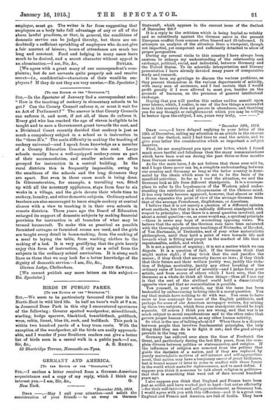[To me Bones or ma “Srammea."1 Ste,—In the Spectator of
January 2nd a correspondent asks : " How is the teaching of cookery in elementary schools to be got? Can the County Council enforce it, or must it wait for an Act of Parliament P " The answer is that County Councils can enforce it, and most, if not all, of them do enforce it. Every girl who has reached the age of eleven is eligible to be taught and to earn a Government grant towards the cost, and a Divisional Court recently decided that cookery is just as much a compulsory subject in a school as is instruction in the "three R's." The main difficulty in making the teaching of cookery universal—and I speak from knowledge as a member of a County Education Committee—is the cost. Large schools usually have a well-equipped cookery-room as part of their accommodation, and smaller schools are often grouped for instruction in a central building. In the rural districts this is frequently impossible, owing to the smallness of the schools and the long distances they are apart. But even in these cases much is being done. In Gloucestershire, for example, a travelling van, fitted up with all the necessary appliances, stays from four to six weeks in a village, and the girls devote their whole time to cookery, laundry, and other domestic subjects. Ordinary school teachers are also encouraged to learn simple cookery at central classes with a view to teaching it in their own schools in remote districts. Three years ago the Board of Education enlarged its support of domestic subjects by making financial provision for instruction in all branches of what may be termed housecraft. To make this as practical as possible furnished cottages or furnished rooms are used, and the girls are taught every detail in home-making, from the cooking of a meal to laying the table, from washing clothes to the making of a bed. It is very gratifying that the girls keenly enjoy this form of instruction, if only as a relief from the subjects in the ordinary school curriculum. It is along such lines as these that we may look for a better knowledge of the dignity of domestic service.—I am. Sir, len,
Glevum Lodge, Cheltenham. JOHN SAWYER. [We cannot publish any more letters on this subject.— En. Spectator.]


































 Previous page
Previous page